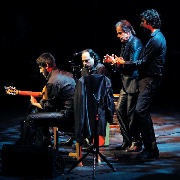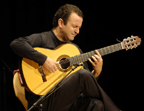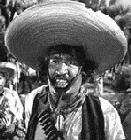Welcome to one of the most active flamenco sites on the Internet. Guests can read most posts but if you want to participate click here to register.
This site is dedicated to the memory of Paco de Lucía, Ron Mitchell, Guy Williams, Linda Elvira, Philip John Lee, Craig Eros, Ben Woods, David Serva and Tom Blackshear who went ahead of us.
We receive 12,200 visitors a month from 200 countries and 1.7 million page impressions a year. To advertise on this site please contact us.
|

|
|
Improvisation?
|
You are logged in as Guest
|
|
Users viewing this topic: none
|
|
Login  | |
|

   
rpguitar
Posts: 27
Joined: Jan. 30 2008
From: New Jersey, USA

|
 RE: Improvisation? (in reply to KenK) RE: Improvisation? (in reply to KenK)
|
|
|
I too am very interested to hear from those "in the know" about this.
As a player who comes from mainly jazz-influenced music and the electric guitar, I know about jazz improvisation. And much of the stuff I hear in flamenco is just mind-blowingly complicated due to the addition of special techiques and very syncopated rhythms. It's hard to believe the guys are concocting all of that on the spot. Maybe it's coming from bits and pieces they have composed, with some elements improvised on the spot. Or, maybe it's totally spontaneous!?
Jazz soloing on the guitar is primarily single note melody lines, with bits of polyphony thrown in, and with relatively straightfoward rhythmic content. Sure, the phrasing can be complex with bends, slurs, etc. - but compared to flamenco it's somewhat one-dimensional.
I have decided after all these years that the real monsters of the guitar are flamenco players! Just a box of wood and bare fingers, and sooo much music comes out...
_____________________________
--
'08 Eliasson hybrid blanca, '07 Hmnos Sanchis Lopez Bulerias negra, '72 Conde blanca
|
|
|
|
REPORT THIS POST AS INAPPROPRIATE |
Date Aug. 27 2008 11:22:25
 |
|

   
Ricardo
Posts: 14833
Joined: Dec. 14 2004
From: Washington DC

|
 RE: Improvisation? (in reply to KenK) RE: Improvisation? (in reply to KenK)
|
|
|
Good topic, I have a lot of thoughts about it. First, modern players and old trad players improvise FLAMENCO falsetas the same way, they have them prepared first, then toss them out at will, not in a specific order, and book end them with compas and remates that might also have been worked out at some point, but don't necessarily need to be the same for each falseta. So as long as you have the rhythm, you can "improvise" either very long phrases of one full compas to several compases, or, just little rhythmic pieces, non of which needs to relate compositionally. In a lot of cases, some flamenco players dont' want to leave out their favorite falsetas, so they will order their falsetas in some way to "compose" a piece, but that does not change the fact that the fundamental phrases are still short and COULD be mixed up and "improvised".
So how is jazz improv different? Well, you have a chart of chords as the structure, more than just a rhythmic base, and you need to adhere to that. But Jazz is not just totally freedom. Most masterful players of jazz ALSO have something like "falsetas". For example, J. Coltrane worked out these phrases of various lengths to handle the tough 2-5-1 changes in Giant Steps. Looking at a transcription, you will notice how he repeats himself a lot. Those are like "falsetas" that the he throws out to not get lost in the chart, and imbetween he tries to create. Most jazz guitarist have similar "licks" that they know will work to go smooth from one chord to the next. In Moron style flamenco for example, they also have lots of short "licks" that they can repeat or play in sequence ad libitum, and know it will hold in compas, but those are not necessarily worked out falsetas. So it is very similar concept.
But Entre dos Aguas was like a bridge to the true jazz concept of a chart. You have a chart structure, then paco plays "falsetas" but a jazz guy can actually ignore the falsetas and play over the chart too. And that is how paco got to play with Al dimeola. mediterranean sundance has a head, then they play "entre dos aguas", and they truly improvise over the chart. Paco plays just a few faletas the same, like the long picado, but mainly it is improv. So later paco introduced the compas of Alegrias to those guys. Chiquito was the tune. Then modern flamenco players picked up the idea. Nuñez's Gallo Azul is a normal buleria in the sense that he mixes falsetas at will, then at the end he establishes an "estribillo" or chorus that repeats, and there you have a "chart" and now he can improvise over the chart in a "jazz" way, but still you have the flamenco compas. So there is your "flamenco jazz fusion" concept, which is still popular. On Calima, Gerardo plays the same piece, but notice the true flamenco portion has a total different mix of falsetas until the same chart appears at the end.
Anyway, so those are my thoughs about it.
Ricardo
_____________________________
CD's and transcriptions available here:
www.ricardomarlow.com
|
|
|
|
REPORT THIS POST AS INAPPROPRIATE |
Date Aug. 27 2008 12:09:59
 |
|

   
mark indigo
Posts: 3625
Joined: Dec. 5 2007

|
 RE: Improvisation? (in reply to KenK) RE: Improvisation? (in reply to KenK)
|
|
|
quote:
PDL .... says that Entre dos Aguas was entirely improvised
quote:
I dont think that he meant that Entre dos Aguas was improvised on the spot at the recording...he might have meant that it was the only composition that wasent tought out before and just knocked it out in the hurry to complete the album
I once heard Paco Peña being interviewed on radio and he said something about there being 2 versions of Entre Dos Aguas, one good and one not so good.
I gave some lessons to a guy once who lent me his old lp copy of Fuente Y Caudal, and sure enough the version of EDA was completely different to the one you hear on any cd (and later lp's) of FYC.
According to Paco Peña the not so good version (on the old lp) really was improvised in the studio as they needed an extra track to complete the album, but the good one that appears on the cd (and later lp's) was "composed" from the ideas that came up in the original improv version.
So maybe PDL really did improvise EDA in the studio, AND he also didn't really learn how to improvise "properly" 'til he got in with McLaughlin et al....?
There's also "rumba improvisada" on Recital De Guitarra and the rumba on Teatro Real to take into account tho'....
quote:
I just listened to both "El Gallo Azul" and "Calima"
Ricardo- do you mean they're the same piece?
sorry, can't resist jumping in here and answering this, but Ricardo can probably tell you a hell of a lot more about the actual differences than i can...
Five tracks on Calima are the "same" (ie. versions of) tracks on El Gallo Azul. They are:
1 Calima - Bulería (with altered tuning),
3 Plazuela - Soleá,
4 Sahara - Tanguillos,
6 Tarifa - Bulería (por medio),
7 Salmedina - Granaína
and correspond to El Gallo Azul tracks:
9 Las Cañas De La Meca - Bulería (with altered tuning),
8 Un Son Eterno - Soleá,
6 Puente De Los Alunados - Tanguillos,
1 El Gallo Azul - Bulería (por medio),
2 La Cartuja - Granaína
hours of fun playing "spot the difference"!
mark
|
|
|
|
REPORT THIS POST AS INAPPROPRIATE |
Date Aug. 27 2008 13:52:38
 |
|

   
rpguitar
Posts: 27
Joined: Jan. 30 2008
From: New Jersey, USA

|
 RE: Improvisation? (in reply to KenK) RE: Improvisation? (in reply to KenK)
|
|
|
Definitely interesting, this comparison. I'm glad in a way to hear that flamenco players don't really improvise heart-stoppingly beautiful falsetas on the fly. (whew)
I like the Giant Steps example. That's a fast piece that goes through all the keys in rapid succession, with a slow melody that floats over the changes. Then when players take solos, they generally "blow" bebop licks ON the changes. Or at least, that's the macho challenge of the tune. Sometimes, in order to do that, you have to play licks or scale fragments because you just can't "hear" as quickly as the changes require.
But there are other approaches to improvising over something like that, and of course the tune is a classic academic study in college jazz programs as a result. And one of the techniques is playing OVER the changes, where you do what the melody does - you allow the chords to blow by as you outline them.
Think of it like drawing a pencil line roughly around a complex shape, versus painstakingly tracing every angle and curve of the shape. I have heard flamenco falsetas that seem to follow both of these schools. Older trad stuff seems to be more of a strict tracing, where you clearly hear each chord outlined. Modern stuff is more abstract - more "over" the changes - where sometimes one's ear can get lost and is suddenly led back into compás when the player decides the time is right. The really funky thing to my still developing ear is that the most advanced modern players really seem to take it "out" and barely even hint at the basic chord progression of the palo. I struggle with that when I compare it to the method books and how they teach that a palo is "supposed" to be.
Anyway, it's all good and sorry for the long post.
Roger
_____________________________
--
'08 Eliasson hybrid blanca, '07 Hmnos Sanchis Lopez Bulerias negra, '72 Conde blanca
|
|
|
|
REPORT THIS POST AS INAPPROPRIATE |
Date Aug. 27 2008 17:05:25
 |
|

   
rpguitar
Posts: 27
Joined: Jan. 30 2008
From: New Jersey, USA

|
 RE: Improvisation? (in reply to KenK) RE: Improvisation? (in reply to KenK)
|
|
|
Thanks guys. As my signature implies, I'm a longtime musician who has absorbed and/or emulated lots of styles from rock to jazz and Brazilian music... and I studied music in college... but I'm totally humbled by Flamenco. 
It's mind-boggling that a folk music evolved into something so nuanced and complex. I wonder if it's almost unique among the world's musics in that regard?
I am not sure what my personal flamenco direction is yet. It may be to play kick-a** falsetas in solo performance or just to incorporate some of the "flavor" and technique into my own writing. But in any case, I have a true respect for understanding the genesis of the music, its history, and what makes it tick.
It's just that, between compas and the litany of uniquely idiomatic guitar techniques, it's a big bite to swallow. Sure wish I was 15 again and just discovering Flamenco. I'd devour it.
Anyway, thanks for the good vibes here and I'll keep reading and learning as much as I can.
Cheers -
Roger
_____________________________
--
'08 Eliasson hybrid blanca, '07 Hmnos Sanchis Lopez Bulerias negra, '72 Conde blanca
|
|
|
|
REPORT THIS POST AS INAPPROPRIATE |
Date Aug. 28 2008 5:22:03
 |
|

   
KenK
Posts: 43
Joined: Aug. 6 2005

|
 RE: Improvisation? (in reply to Ricardo) RE: Improvisation? (in reply to Ricardo)
|
|
|
quote:
Gallo Azul=Tarifa. That was the example I was after with the standard falsetas getting tossed out, then a "chart" at the end.
In the end, whether you want to learn a "jazz" style improv or a "flamenco" style improv, you will never "get it" unless you study some transcriptions or learn some authentic "licks" in the style. So don't worry so much about it now, just try to learn some of the music that inspires you and you will get it eventually.
I'll have to get those Gerardo cds, I only have 3 of his now.
As to "jazz" or "flamenco" style improv, at this point I have a handle on the tonality and some of the rh stuff. People who aren't flamencos think I'm playing flamenco, I tell them it's not real flamenco and they just stare at me blankly. I do look at transcriptions, but I'm doing this to get a sense of guitar mechanics and phrasing rather than learning someone else's "licks". Maybe I'll rethink this.
This sort of brings up a larger philosophical issue that I'm wrestling with.
As much as I learn about another music (one that I wasn't born into)
I just don't think I'll ever play it in a genuinely authentic manner.
I can't just decide to have different roots. Sure, I can work hard, do the dance class, study w/ a "Master" route, eventually have a good sense of compas, but am I ever going to play this music as if I was born into it? I respectfully think not. As far as this goes, I'll have to be content w/ some kind of flamenco fusion.
I can learn new things and grow but I can't ignore my own roots. I don't think I should either.
Ken
|
|
|
|
REPORT THIS POST AS INAPPROPRIATE |
Date Aug. 28 2008 7:16:44
 |
|

   
rpguitar
Posts: 27
Joined: Jan. 30 2008
From: New Jersey, USA

|
 RE: Improvisation? (in reply to KenK) RE: Improvisation? (in reply to KenK)
|
|
|
Ken, we seem to have a lot in common. Nicely expressed thoughts regarding the "roots" issue, fusion, and guitar mechanics.
Clearly I don't have musical roots in Flamenco, but I'll bet many people here didn't either, yet they have dedicated themselves fully to it. Jazz players usually have a similar dedication too, and jazz has also long since left its demographic roots; all cultures have adopted it.
I will always be a musical mutt. I struggle with it at times, but I enjoy fusing many influences and I find it very enriching. Still, I have not been so inspired in years as I have become since getting bitten by the Flamenco bug... I don't want the difficulty factor to be an excuse!
Hopefully mutts are welcome here. 
_____________________________
--
'08 Eliasson hybrid blanca, '07 Hmnos Sanchis Lopez Bulerias negra, '72 Conde blanca
|
|
|
|
REPORT THIS POST AS INAPPROPRIATE |
Date Aug. 28 2008 10:14:50
 |
|

   
mrMagenta
Posts: 942
Joined: Oct. 25 2006
From: Sweden

|
 RE: Improvisation? (in reply to KenK) RE: Improvisation? (in reply to KenK)
|
|
|
There are different accents within flamenco in Spain, a foreign accent doesn't have to be any less genuine imo. If you love a certain feeling, attitude or spirit you find in music, you are already relating to it. A poet who's good at reciting poetry still sounds genuine even if he has a foreign accent.
If you're well versed in jazz, blues, transylvanian folk music or whatever, you have probably distilled some elements that have become very personal to you. Feel free to incorporate those into whatever music you're playing. I believe it can be done in good taste.
I do know what you're talking about, i've seen my share of 'world music' ensembles that have made me blush, but i don't think the accent thing will stay awkward as long as you make the music meaningful to you, so that it doesn't end up being detached mimicry - that will ultimately mean different things to different people.
Personally I'm not sure where i'm going with flamenco, i doubt it will become stylistically pure. I do hope, however that it will sound genuine.
|
|
|
|
REPORT THIS POST AS INAPPROPRIATE |
Date Aug. 28 2008 16:56:44
 |
|

   
mrMagenta
Posts: 942
Joined: Oct. 25 2006
From: Sweden

|
 RE: Improvisation? (in reply to KenK) RE: Improvisation? (in reply to KenK)
|
|
|
Of course, copying what people are playing very closely will be important in the learning process.
I've only been learning flamenco for less than three years, but I've been feeling concerned about these things right from the start..
I think there might be a difference between 'hey, i want to play what those guys are playing' and 'hey, i want to learn their craft'. People personalize things differently. Some manage stick to the source material very closely and assimilate it to such a degree that it becomes their own voice. There will be personal nuances, but you won't hear them as foreign accent. Look at Grishas playing on youtube for instance.
As a listener you sense these things. You can tell the difference when someone makes a gesture because it is natural to them, or if they do it just to fit the style or flash around. You need to make the music meaningful to you, once you do, you'll start collecting stuff that is natural to you - keep evolving that stuff and the genuinity of the music will project to the audience.
Flamenco is so broad, there are so many different 'aires', there are chunks of stuff that will be more or less natural to any kind of person right from the outset, i'm sure.
|
|
|
|
REPORT THIS POST AS INAPPROPRIATE |
Date Aug. 29 2008 8:15:51
 |
|

   
Mark2
Posts: 1872
Joined: Jul. 12 2004
From: San Francisco

|
 RE: Improvisation? (in reply to KenK) RE: Improvisation? (in reply to KenK)
|
|
|
I think there is a lot of improv in flamenco, but it's a bit different than what a jazz soloist does. When playing for a dancer, a flamenco guitarist improvises in much the way a jazz piano player might when comping. He hears-sees steps and then creates a rhythmic part to go with it. He might also grab a chord on the fly. Probably it's not a voicing he never played before, but maybe he never played it at that point in the dance. I think that's very similiar to a jazz pianist playing behind a soloist, who when he hears the soloist do a diminished scale lick, he plays a different chord than the one on the chart to compliment the lick.
On the Tomatito instructional DVD, he plays falsetas fast, then slow. The slow version is in some cases slightly different. It's almost as though he can't play it the same way twice even if he wanted to, as he feels the falseta differently at the slower tempo.
Also , in concert, Paco, Tomatito, Vicente, all do slight variations of their falsetas. They change accentuation, crop it, do a different ending, etc. Paco changes many falsetas constantly. The bulerias he plays live tend to have falsetas from various bulerias he has recorded over the years.
So, a question is, when he recorded Cepa for example, did he pratice it exactly the same a thousand times and then record it? And then decide he was never going to play it exactly like that again? I doubt it. I think that he probably did several takes, kept the best, and that they were all slightly different. My take is that they are always improvising some things here and there.
quote:
ORIGINAL: KenK
Here's a good "noob" question:
How much improvisation is there in modern flamenco?
I used to think there was more improv in flamenco than jazz, but as I listen more I think it's much less if any.
Often I see live versions on youtube of studio recordings I have and it's pretty much the same.
I just got the PDL documentary "Light & Shade" from netflix.
Somewhere in there he says he really didn't start improvising until he hooked up w/ McLaughlin, and was very uncomfortable w/ it at first.
In another place he says that Entre dos Aguas was entirely improvised.
This is about a decade earlier.
Any insight?
Thanks,
KenK
|
|
|
|
REPORT THIS POST AS INAPPROPRIATE |
Date Aug. 29 2008 8:16:58
 |
|

   
Ricardo
Posts: 14833
Joined: Dec. 14 2004
From: Washington DC

|
 RE: Improvisation? (in reply to mrMagenta) RE: Improvisation? (in reply to mrMagenta)
|
|
|
You guys were going back and forth about the authenticity in your own playing, coming from a different genre or country etc. I have the same feelings even today. Even I have been embraced by gitanos and been very well encouraged, and in some cases I have unintentionally "fooled" flamencos into thinking I am from their city for example. The mimicry you describe is exactly how the flamenco's themselves learn... imitating. I like very much jerez style stuff, and as long as I dont' speak and just play, it has been hard for some spaniards to understand just how "american" I am.
I can admit that I know I am a "fake" in that sense, but to be honest, when you are in an intense juerga with gitanos singing and dancing or cheering your falsetas or whatever, it feels like you are really doing it...and YOU ARE. It is that simple. So on one hand don't beat yourselves down into thinking you won't EVER be authentic, because yeah it is true, you are who you are. But, you can still do a good job and be satisfied with yourself, and keep being yourself, if you keep respecting the art and where and who it comes from.
Ricardo
_____________________________
CD's and transcriptions available here:
www.ricardomarlow.com
|
|
|
|
REPORT THIS POST AS INAPPROPRIATE |
Date Aug. 29 2008 13:26:54
 |
|
 New Messages New Messages |
 No New Messages No New Messages |
 Hot Topic w/ New Messages Hot Topic w/ New Messages |
 Hot Topic w/o New Messages Hot Topic w/o New Messages |
 Locked w/ New Messages Locked w/ New Messages |
 Locked w/o New Messages Locked w/o New Messages |
|
 Post New Thread
Post New Thread
 Reply to Message
Reply to Message
 Post New Poll
Post New Poll
 Submit Vote
Submit Vote
 Delete My Own Post
Delete My Own Post
 Delete My Own Thread
Delete My Own Thread
 Rate Posts
Rate Posts
|
|
|
Forum Software powered by ASP Playground Advanced Edition 2.0.5
Copyright © 2000 - 2003 ASPPlayground.NET |
0.125 secs.
|


 Printable Version
Printable Version








 . No, but seriously... the guitarrists your talking about have played this so long, the variations come by itself and it is absolutely neccessary to start with the method books even if the goal is nowhere near that type of music or playing style.
. No, but seriously... the guitarrists your talking about have played this so long, the variations come by itself and it is absolutely neccessary to start with the method books even if the goal is nowhere near that type of music or playing style. 



 New Messages
New Messages No New Messages
No New Messages Hot Topic w/ New Messages
Hot Topic w/ New Messages Hot Topic w/o New Messages
Hot Topic w/o New Messages Locked w/ New Messages
Locked w/ New Messages Locked w/o New Messages
Locked w/o New Messages Post New Thread
Post New Thread